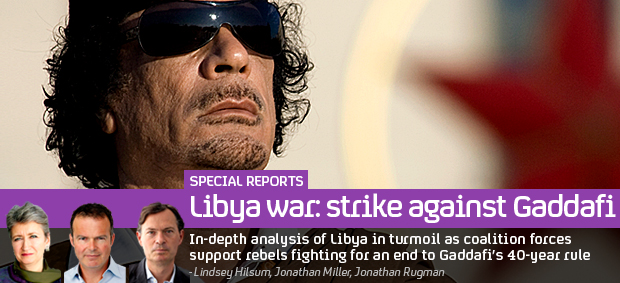Oppressed Berber people hope for the fall of Gaddafi
“But will Colonel Gaddafi be gone by then? Everyone has their own theories. It’ll be over by Ramadan. Nato has to end it by August. He won’t be here at the end of the year. And then the vague ones. His days are numbered. It’s only a matter of time.”
The thump of incoming mortars woke us up at around 7am. Colonel Gaddafi’s troops were loosing off towards the town of Nalut, high in the Nafousa Mountains. This time the rebels didn’t respond. By the time we got up to the lookout, all was silent.
“The mountains fight for us,” said a lanky man called Askar who used to be an English teacher.
But there’s a limit to how much the Berber people who live in the Nafousa Mountains can capitalise on their advantage. Swathed in dust-covered cloth, bearing antique shotguns, they sit on the commanding heights looking out over the plain where Ghaddafi’s troops are gathered in villages. The mountain rebels have taken control of the towns along the mountain-ridge – Nalut, Jadu, Zintan, Yefren – and are closer to Tripoli than the fighters in Misrata to the east. The frontline at Kiklah is only 100 miles west of the capital. But they are unable to push their advantage. When they tried last Friday, they got severely battered. On Monday, the Transitional National Council in Benghazi told them to stop trying to push Ghaddafi’s forces back because they were losing too many men.
The Berber people have the many reasons to hate Colonel Gaddafi. Khaled, another teacher, took to me to Nalut stadium where, aged 14, he was brought with the rest of his class to watch five local men hang. The noose was looped around the horizontal bar of the goal they used for football matches. The men were brought out, hooded, and everyone was told to cheer. Soldiers stood around the stadium ready to shoot any dissenters. It was 1994, and the men had allegedly taken part in a failed coup against Colonel Gaddafi.
Khaled won’t forget the fear he felt, but he’s starting to throw it off. Under Gaddafi, he said, Berbers weren’t allowed to speak their own language in public and were forced to give their children Arabic names. He’s now planning to rename his two and four-year-old daughters with traditional Berber names. The eldest will be Mirine. He talks with enthusiasm of the Spring Festival they’ll hold next March in Nalut’s picturesque mud-walled old town, inviting tourists to celebrate Berber culture and the overthrow of Colonel Gaddafi. “You must come!” he cried.
But will Colonel Gaddafi be gone by then? Everyone has their own theories. It’ll be over by Ramadan. Nato has to end it by August. He won’t be here at the end of the year. And then the vague ones. His days are numbered. It’s only a matter of time.
In fact, no-one knows. The Colonel and his sons are not running away or giving up. Their soldiers are well-armed and fighting. Nato strikes have weakened them, but not decisively. In Tripoli, people still live in fear and do not protest in large enough numbers to make an immediate difference.
The Berbers of the Nafousa Mountains would love to be the first rebels to reach Tripoli, but that last 100 miles will be the hardest yet.
